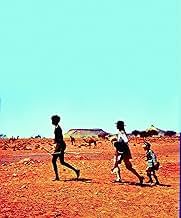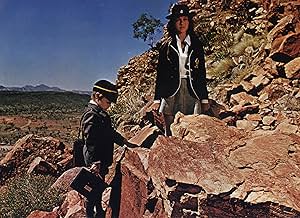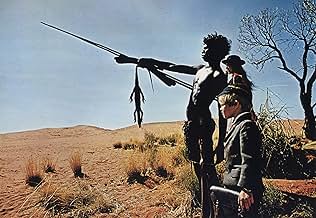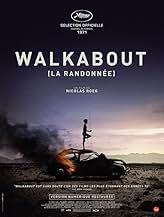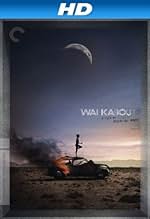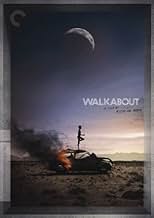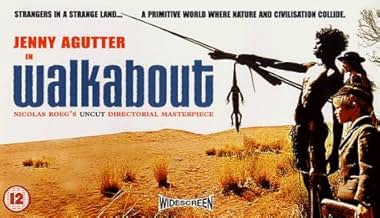AVALIAÇÃO DA IMDb
7,6/10
29 mil
SUA AVALIAÇÃO
Dois irmãos criados na cidade estão confinados na Austrália, onde aprendem a sobreviver com a ajuda de um menino indígena.Dois irmãos criados na cidade estão confinados na Austrália, onde aprendem a sobreviver com a ajuda de um menino indígena.Dois irmãos criados na cidade estão confinados na Austrália, onde aprendem a sobreviver com a ajuda de um menino indígena.
- Direção
- Roteiristas
- Artistas
- Prêmios
- 1 vitória e 1 indicação no total
David Gulpilil
- Black Boy
- (as David Gumpilil)
Robert McDarra
- Man
- (as Robert McDara)
Peter Carver
- No Hoper
- (as Pete Carver)
Noeline Brown
- German Scientist
- (as Noelene Brown)
George Roubicek
- Radio Announcer
- (narração)
- (não creditado)
- Direção
- Roteiristas
- Elenco e equipe completos
- Produção, bilheteria e muito mais no IMDbPro
Avaliações em destaque
Goodness gracious it's amazing how many reviewers missed the most obvious aspect of the film. This tale is about innocence and it approaches that from many different angles. As for Roeg practicing camera tricks-maybe today these are tricks but at the time the style was a pioneering method of telling and showing psychological elements, wasted on todays audiences. Roeg presents innocence in juxtaposition with the hardness and neuroses of society, not as WHITEMAN BAD but as society, modern society makes us very neurotic by taking away our innocence. Roeg makes an brilliant point and stylizes a mostly nonverbal experience by letting us journey with children all on the cusp of some new stage of growth. This movie is a small masterpiece!!
"In Australia, when an Aborigine man-child reaches sixteen, he is sent out into the land. For months he must live from it. Sleep on it. Eat of its fruit and flesh. Stay alive. Even if it means killing his fellow creatures. The Aborigines call it the WALKABOUT. This is the story of a 'WALKABOUT'." Thus begins Nicolas Roeg's 1971 debut feature, "Walkabout", one of the most beautiful, mystical, and magical film I've had the privilege of seeing as a filmgoer. Seeing it again recently on the beautiful Criterion edition DVD, I was once more captivated by this film as it slowly worked its magic on me. The "plot" of "Walkabout" is simplicity itself: a teenage girl (Jenny Agutter) and her little brother (the director's son in real life, Lucien John Roeg--billed "Lucien John" on the credits) are stranded on an Australian outback as their father, who took them out for a picnic, suddenly and inexplicably commits suicide. The two of them are thus left wandering by themselves and it looks as if they will die in the vast wilderness--until they encounter an Aborigine boy who is on his "walkabout," an Aborigine rite of passage into manhood. For a time these kids travel together as a trio and the Aborigine's skills in hunting and finding water allow them to survive. And although the girl and her brother will eventually find their way back to civilization, for a brief unspecified length of time the exotic Australian outback becomes a wondrous and mystical place where their story of survival unfolds. If you've seen this film, you know that the brief synopsis above doesn't really touch what is so special about "Walkabout." And that is because "Walkabout" isn't really about plot, like more conventional films. It is one of those rare films like Peter Weir's "Picnic at Hanging Rock," Terrence Malick's "Days of Heaven," and Wim Wender's "Wings of Desire" which are all about evoking a kind of sad and bittersweet emotional response from us. I think that is what "Walkabout" is mostly about. The overall impact of this film "hits you in the heart" and very impressionable viewers might be stirred in their emotions to the point of swooning in the scene at the end where the girl, now a married woman, remembers her idyllic days happily swimming in one of the outback's water holes Nicolas Roeg was not only the director of "Walkabout" but also its cinematographer. And his photography in this film is unbearably beautiful and sumptuous. "Walkabout" is without a doubt one of the most gorgeous color films ever made. Shot on location in the Australian outback--perhaps one of the most exotic places on earth--"Walkabout" has a visual grandeur that is reminiscent of passages from David Lean's "Lawrence of Arabia" and John Ford's "The Searchers." Never has the "voodoo of location shooting" (as Werner Herzog likes to call it) been more manifest than in this film. In fact, the exotic and unique location in which it was shot, coupled with Roeg's masterful cinematography, feels like one of the main characters in "Walkabout." The film's location adds a mystical (almost spiritual) and meditative dimension to it which lingers in the viewer's mind--haunting it long after the film is over. If Roeg's photography is one of the film's main characters, so is John Barry's legendary and justly famous score. Maybe it's the harp used in the score, or the subtle billowing quality of its composition (i.e. the way its beautiful melody gently builds and builds), but the music in this film simply soars. It moves me like no other score I've ever heard. It feels completely transcendent, as if it exists outside time and space altogether--but gently swooping down from time to time, "kissing" this film's images with aching sweetness. All of the above elements work together to form a film-viewing experience that inspires both beauty and awe in us. The film's message is not necessarily that life in the outback is better than life in a modern civilization, but that no matter where you happen to find yourself (even if that happens to be a wilderness like the Australian outback), if you have resources that meet your basic needs, it can become your "home" for a time. And that afterwards there is bitter-sweetness in reminiscing about those "good times" you were fortunate enough to have--to which you can never return again.
10Tophee
Superb cinematography, the Australian outback comes alive in this film of self discovery and regret. Agutter plays the English girl brilliantly, incapable of comprehending anybody or anything that doesn't conform to her middle-class values and upbringing. Roeg is also excellent as her brother, adapting to each and every change in circumstance as only children can. I have watched this movie many times, and always get something new from it. Highly recommended to anyone, although parents might want to watch it before letting their kids see it.
I first remember seeing this film as a late teenager in about 1979. Therefore what most vividly stuck in my mind was the lead character played by a beautiful blonde English girl, Jenny Agutter, Specifically the nude scenes of her swimming and washing.
On a less superficial level it is a film with a point-something along the lines of the graciousness of Aborigines and their ability to live in harsh surrounds, and the destructive nature of suburban life in a flat in a major city.
I think it would be a film, like Jedda, that will always be on reference for the Australian Outback, Aboriginals and the modern society which brought a European civilisation to their land.
On a less superficial level it is a film with a point-something along the lines of the graciousness of Aborigines and their ability to live in harsh surrounds, and the destructive nature of suburban life in a flat in a major city.
I think it would be a film, like Jedda, that will always be on reference for the Australian Outback, Aboriginals and the modern society which brought a European civilisation to their land.
Although this is a sound film, and the characters talk to one another, this film could have been made just as well in the 1920s. It does not really need sound.
The film is about nature, and man's relationship with it. If a civilised person were left out in the desert, then they would soon die. But, as this film shows, there are people and creatures living out there quite happily.
The film has been criticised for having a weak beginning and a weak end. But where does the story of this film start? And where and when would you end it? Yes you can end it when the two children get back to civilisation. But does the story end there? No. Because of their experiences, things are never going to be the same again. And for them, the story has not finished, it is only just beginning.
I have seen this film several times and I notice something different every time I see it.
The film is about nature, and man's relationship with it. If a civilised person were left out in the desert, then they would soon die. But, as this film shows, there are people and creatures living out there quite happily.
The film has been criticised for having a weak beginning and a weak end. But where does the story of this film start? And where and when would you end it? Yes you can end it when the two children get back to civilisation. But does the story end there? No. Because of their experiences, things are never going to be the same again. And for them, the story has not finished, it is only just beginning.
I have seen this film several times and I notice something different every time I see it.
Você sabia?
- CuriosidadesLuc Roeg was actually sun-burnt in the scene where the aboriginal boy treats his back by rubbing him with fat from a wild boar. Director Nicolas Roeg thought it would make a good scene for the film so he picked up the camera and shot it.
- Erros de gravaçãoThe credits name the actor playing "Black Boy" as David Gumpilil. It should be David Gulpilil.
- Citações
Narrator: [last lines - from "Poem XL" by A.E. Housman's "A Shropshire Lad"] Into my heart an air that kills, From yon far country blows: What are those blue remembered hills, What spires, what farms are those? That is the land of lost content, I see it shining plain, The happy highways where I went, And cannot come again.
- Cenas durante ou pós-créditosAfter the credits, there is a flash of white light on the screen and as it becomes a black screen, radio tuning is heard while the words "rien ne va plus" are shown.
- Versões alternativasA director's cut of this movie was released in 1997 with 5 additional minutes. This cut is identical to the original British release version (100 minutes): the film was shortened by five minutes for its original American release.
- ConexõesEdited into Terror Nullius (2018)
- Trilhas sonorasElectronic Dance
Written and performed by Billy Mitchell
Principais escolhas
Faça login para avaliar e ver a lista de recomendações personalizadas
- How long is Walkabout?Fornecido pela Alexa
Detalhes
- Data de lançamento
- Países de origem
- Idiomas
- Também conhecido como
- Encuentro de dos mundos
- Locações de filme
- Empresas de produção
- Consulte mais créditos da empresa na IMDbPro
Bilheteria
- Orçamento
- AU$ 1.000.000 (estimativa)
- Faturamento bruto mundial
- US$ 1.888
Contribua para esta página
Sugerir uma alteração ou adicionar conteúdo ausente


